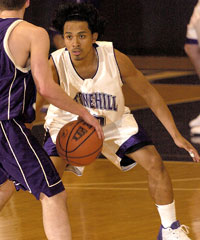NCAA News Archive - 2006
« back to 2006 | Back to NCAA News Archive Index
Stonehill student-athlete sheds difficult family history to become a role model for peers
|
The NCAA News
It’s hard to
Not just because of his skill, although it is considerable. Once the leading three-point shooter in
However, Toun also may catch the attention of crowds for a different reason. He is one of six children born to parents who fled to the
Toun’s parents, Loeuth and Yann, chose to settle in
By his own admission, he wasn’t even interested in basketball until about age 12.
“At that time, I had just moved to another part of
Largely self-taught, Toun began to hone his basketball skills on the neighborhood courts, and his improvement has been steady. He tried out for the sixth-grade team, but didn’t make it. The next year he tried out for the middle school team, and although he earned a place on the squad, he saw little playing time. However, by the following year Toun had worked himself into a starting position on the eighth-grade team.
In high school, Toun added a second sport, volleyball, but continued to excel on the court, where he was an integral part of two state-championship teams. He also picked up most-valuable-player honors for his performance in each tournament.
The communications major at Stonehill has gone from making 22 appearances as a freshman to coming off the bench in all 34 of the Skyhawks’ games during the 2005-06 season to average 5.1 points and 1.6 rebounds. He also contributed 45 three-pointers, including nine treys in five NCAA tournament games. Stonehill finished with a school-record 27 wins, its first Northeast-10 Conference regular-season title in eight years and its first Northeast regional championship. The Skyhawks made it as far as the semifinals in this year’s NCAA Elite Eight before falling to eventual national champion
Toun’s parents do not talk about what life was like in
“I know how bad it was. Even though they don’t talk about it, it’s just understood that it was a bad thing. We’re here now and we’re living a better life,” said Toun, who also noted that although he knows he’s one of a few Asian athletes, he doesn’t feel any added pressure to do well. “I think it’s a privilege because there are so few Asian athletes. I think it’s more of a privilege than pressure because there’s pressure on everybody. You just have to go out and do what you do best.”
His success, however, has not gone unnoticed. Toun said he knows that many younger kids, especially those with backgrounds similar to his own, look up to him.
“When I go back home they ask how I got so good. I just tell them it’s practice. You practice and you get better,” he said. “It’s so easy to fall under a bad influence. There are a lot of stereotypes about being in gangs, especially people with Asian backgrounds. But I tell them not to get caught up in the mix. Do what you want to do, do what’s best for you and don’t try to satisfy other people.”
© 2010 The National Collegiate Athletic Association
Terms and Conditions | Privacy Policy

